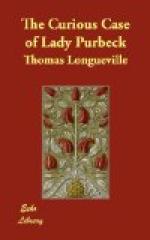When we consider the position of a very beautiful girl of between twenty-one and twenty-four, who had had such an education, had endured such villainous treatment, and was now placed under such trying conditions, we can but feel prepared to hear that some or other of the usual results of bad education, bad treatment, and bad surroundings exhibited themselves, and surely if trouble, and worse than trouble, was ever likely to come of a marriage that had been an empty form, Lady Purbeck’s was one after which it might be expected.
And it came! Near Cripple Gate, at the North Wall of London, in October, 1624, was born a boy named Robert Wright. More than a century later the Vicar of the Parish was asked to refer to his registers about this event, and he sent the following reply:—[60]
“London, April 10 1740.
SIR,
“I have searched my Parish Register according to your directions and have found the following Entry concerning Robert Wright.
“Christening in October 1624.
“Robert, Son of John Wright, Gentleman, of Bishopthorpe in Yorkshire, baptised in the Garden House of Mr. Manninge at the upper end of White Cross Street ... 20th.
“I am, Sir,
“Your
very humble servant,
“WILL
NICHOLLS,
“Vicar
of St. Giles’s Cripplegate.”
The father of this boy was, in reality, Sir Robert Howard, the fifth son of the Earl of Suffolk, the Earl to whose vigilance the discovery of the Gunpowder Plot is attributed by some authorities. But Suffolk had incurred the enmity of Buckingham, had been deprived of the office of Lord Treasurer, had been tried for peculation in the discharge of it, and then condemned in the Star Chamber to imprisonment in the Tower and a fine of L30,000. When he was liberated, he was told that two of his sons, who held places in the King’s household, were expected to resign them; but Suffolk, in very spirited letters to the King and to Buckingham (Cabala, pp. 333, 334), protested against this. The whole family, therefore, was in bad odour at Court and with Buckingham at this time.
Sir Robert Howard was a brother of the first Earl of Berkshire, who married a niece of Lady Elizabeth Hatton. It may possibly have been through this connection by marriage that Sir Robert Howard became acquainted and intimate with Lady Purbeck; and, to make a long story short, let it be observed here that, in relation to the boy who was christened Robert Wright, Lady Purbeck had had what, among the lower classes, is euphemistically termed “a misfortune.”
FOOTNOTES:
[55] S.P. Dom., James I., Vol. CLIII., No. 6.
[56] S.P. Dom., James I., Vol. CLII, No. 13.
[57] S.P. Dom., James I., Vol. CLXX., No. 54, 24th July, 1624.
[58] Cabala, Sive Scrinia Sacra, etc., p. 318.




